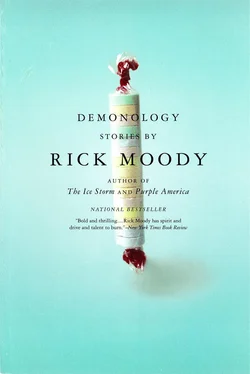— Sorry for the trouble.
As though he had never met her.
— Thanks. He unscrewed the lid fast. Orange soda was fountained. He brushed a dribble off himself.
— We’re having a little art opening later. Come on by.
— Uh, prior engagement.
Back on her side of the street, a guy sat himself on the hood of a station wagon, in front of her building. He too drank her soda. Her Diet Coke. What kind of operation you running here, huh? He gestured at the gallery. She let it all go, headed for the door, and the three steps seemed steeper, more demanding, as if this were part of her performance and the audience behind would be watching. She loved her boyfriend, at least right now she loved him, even if he didn’t seem to have many friends, even if there were nights when she would come home from school and she would find him alone in the house, with the videocassette recorder fired up, the one that they’d gotten from her parents, beside it a sequence of horror films that he loved since his childhood. Who are we going to invite to the gallery opening? she asked. Don’t worry about that. That’s the easy part. They had addressed a few invitations, maybe thirty, but would any of those people actually come? There were a few people he knew from his day job in the city, as bibliographer for the Encyclopedia of the History of Religions. He would get a dozen index cards with names like Mercia Eliade or Rein-hold Niebuhr on them; he would go down into the maze of stacks at Columbia, see what he could see, a Festschrift published in The Hague, some old numbers from the Religious Anthropology Quarterly. Akhenaton’s or Moses’ conception of monotheism. If he did enough of these cards, hourly, he’d have enough money to pay, temporarily, for his long distance calls, in which he invited friends from Austin or Burlington to come to Hoboken for the show. She searched deep into the recesses of her purse. Nope, not in that front pocket, maybe in the zippered pocket in the front, and, okay, if not there, don’t panic, they’re in the back pocket, she never put them in the back pocket, okay, shit, where are the keys, she had no pocket on her skirt, of course, women weren’t supposed to have pockets, but she checked nonetheless, absurdly patting down her front and her rear as though there were pockets, then back around again, the entire sequence, front pocket, back pocket, interior pocket, glancing toward the mayhem on Madison Street, where the hellwas Gerry, and why weren’t her keys in here? Her mind rushed back over the last half hour. When she was fighting with the dogs, did she have them then? Had the keys fallen out when she had stumbled on the sidewalk? Was there a snapshot in her recollection of a purse overturned, a glint of her silver key chain on the sidewalk? She tried the knob, an old rusty thing on the metal door. It didn’t give.
Across the street, Joey and Mike, helping Anthony down the sidewalk.
A homeless guy had shown up from a squat in one of the nearby industrial buildings. The homeless situation was expanding here in Hoboken, M. J. believed; once there had been these hotels down by the terminal, the Hotel Victor, for example, a hotel that existed as a satellite business around the Irish bars, watering holes where floozies and drunks who had lost the weeks wages on dog races would console and antagonize one another. These were the hotels where these men lived, beside immigrant women and their children; anyhow, when that garish restaurant opened next door, the one with the loud sound system and the waitresses with silicone implants, well then, the hotels had to close, couldn’t afford the upwardly adjusted rents, these people couldn’t afford to live where they had always lived and so they were going to have to leave. Some penniless adventurer had spray-painted protest language on the door of the Hotel Victor, Where will these men go? And there were multi-colored T-shirts appearing in town, with this language upon them, with the dingy Victorian façade of the hotel and its sign, and beneath, Where will these men go? But even the adventurer who had spray-painted the hotel was worn down by the futility of political opposition in the medieval town given entirely to political patronage, under federal investigation for the worst public schools in the state, and the men who lived in the Hotel Victor were loosed upon the street, and it was about that time that she started to notice one of the midtown homeless regulars, Aaron was the guys name, or at least that was what people called him, a delicatessen owner told her, and Aaron, the interesting thing about Aaron, in addition to the fact that he usually wore a hockey helmet which was to keep in his brains, the unusual thing was that he was, she believed, a gay homeless person, which you didn’t encounter every day, although she imagined, after all, that problems like mental illness struck in equal percentages across demographic categories. Underneath the grime and the strawberry-blond beard and the hockey helmet, Aaron seemed delicate, fine, frail, a scarecrow, and his gestures were balletic, as with the male dancers she knew. Iwant to write poetry. I want to compose ballets. I am God, as Nijinsky said. She could imagine making a piece for Aaron to dance, and it would have a lot of Nijinsky’s word associations for Aaron to recite while dancing. Aaron was frequently darting around bus stands pointing frantically at things and people who were not immediately apparent, and waving a half-empty bottle of Miller Genuine Draft. There were perfectly sane homeless people, of course, and unlucky homeless families, but Aaron wasn’t one of these. He was a deinstitutionalized homeless person. It would have been difficult to get him to perform combinations properly, though maybe he could have been videotaped, phrase by phrase, as in the abstract videos of Cunningham that M. J. liked; and what was he doing here, at the head of Mrs. Vincenzo’s prone body, as she regaled paramedics?
— The one young man who started that restaurant on Washington Street. I knew him when he was just a boy. His parents are very proud of him. Very proud. Told me that he got the idea for it from eating sandwiches over to the Jersey shore. This goes back a ways. My own boy was in the armed forces then.
— Mrs. Vincenzo, you shouldn’t talk.
— I’ll talk if I want to.
— Buddy just move off a couple feet, here, give the lady some fresh air, the paramedic remarked to Aaron, over whose face then passed a dark cloud of rejection. Meanwhile, adjacent, the operator of the crosstown bus, on the radio, — A fender bender type thing. A flat. Young lady been nice enough to give away some of her soft drinks, and the kids? They all drinking sodas. Some playing cards.
— You want me to get that open for you? Offered the guy on the hood of the station wagon, motioning at M. J.’s front door. — Could open that easy. Just need a credit card or something. Let me do it.
Every northeastern town had its eccentric with the artificial tan. Many of these characters got their tans from local tanning salons, and Hoboken had a tanning salon, but it was on the uptown end where M. J. rarely traveled and anyhow she believed that tanning salons involved irradiation. Fair of skin, as her family were all fair of skin, she was from a long line of ivory that in winter looked delicate and in summer looked unhealthy, people of the ice, this ancestry of Anglo- and Irish-Americans who by birthright didn’t have to live in towns that were built up on swamps as Hoboken was, she was white, and this gentleman on the hood of the station wagon was tanned through some means, through an applied juice, a poultice, an Egyptian henna or some such, which he attempted to mete out over himself evenly, under cover of night, in a harsh bathroom fluorescence.
Читать дальше












